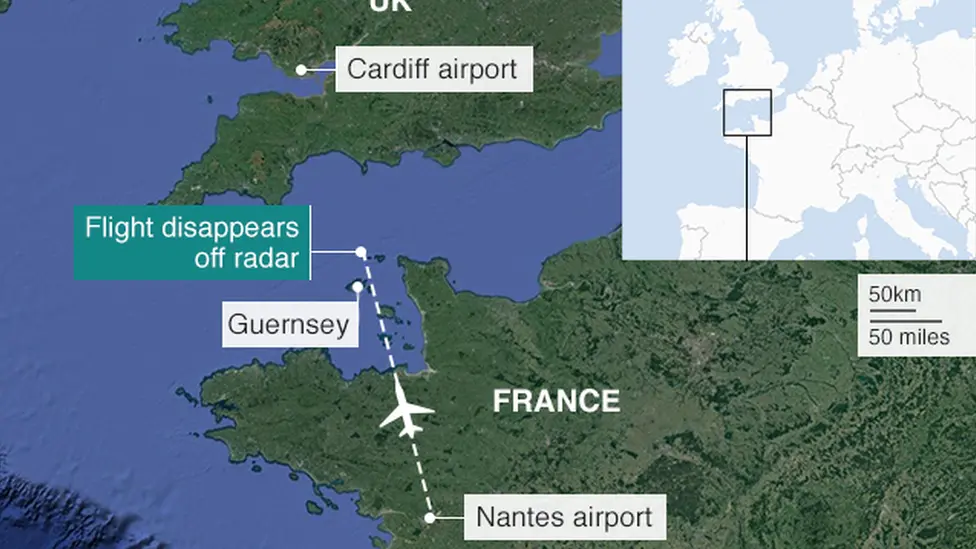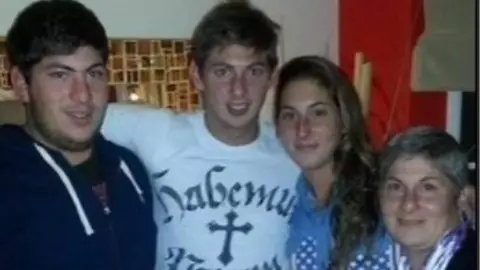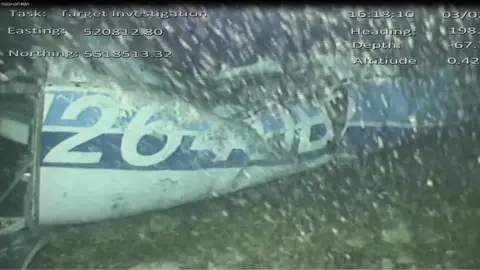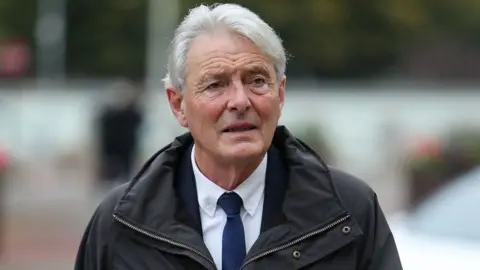Emiliano Sala: Footballer died after plane broke up mid-air
Footballer Emiliano Sala died instantly from "head and trunk injuries" when the plane he was in crashed after breaking up mid-air, a jury has found.
They also concluded he was likely to have been "deeply unconscious" from carbon monoxide poisoning on the unlicensed flight.
Sala and pilot David Ibbotson died when the plane they were flying in crashed in the English Channel in January 2019.
The 28-year-old had been flying to Wales from France to join Cardiff City.
David Henderson, who arranged the flight, was given an 18-month prison sentence for aviation offences relating to arranging the flight.
The jury concluded Sala died in the crash having been overcome by toxic levels of carbon monoxide from the aircraft's faulty exhaust system.
The body of Mr Ibbotson, from Crowle, Lincolnshire, has never been found.

Speaking exclusively to the BBC, Sala's younger brother Dario described the impact his death had on the family.
"We just couldn't believe it, we couldn't accept it. It was so shocking for us as a family. Even now we can't believe it and we'll never really believe it," he said.
"For me, my brother was always the best, the greatest, even before he became a professional footballer and came over here - he was my brother."
During the inquest, Dorset Coroner's Court was told Henderson had been investigated for illegal public transport flights before, but he was was not monitored following the initial investigation.
 AFP
AFPHe arranged for Mr Ibbotson to take the footballer from Cardiff to Nantes and back again, when the plane crashed en-route to Cardiff.
The inquest jury heard Sala's blood had 58% carbon monoxide blood saturation, a level a pathologist called "severe poisoning".
 Family photo
Family photoExplaining how carbon monoxide could have entered the Piper Malibu's cabin, Brian McDermid, who works for the Air Accidents Investigation Branch, said it most likely came from exhaust gases seeping into the cabin through a heating system.
But, he added, during its last maintenance check "there was no evidence to suggest that the aircraft was not serviceable or fit to do that flight".
 AAIB
AAIBIn a statement, Sala's family said the inquest had "shone a bright light on many of the missed opportunities in the worlds of football and aviation to prevent his tragic death".
"The family particularly note the jury's findings that it is likely that both the pilot and Emiliano suffered from carbon monoxide poisoning and that Emiliano was deeply unconscious at the time of the accident, and that the poisoning was caused by a failure in the aircraft exhaust system," they added.
"The family also welcome the coroner's decision to communicate to the relevant authorities her concerns about the safety issues arising from this inquest in order to prevent similar future deaths. No family should have to go through grief from a similar avoidable accident."
Coroner for Dorset Rachel Griffin is recommending that the UK Secretary of State for Transport Grant Shapps consider giving the Civil Aviation Authority more powers to tackle the "illegality of these flights and the risks associated with them".
She is also sending her prevention of future deaths report to the UK Digital, Culture, Media and Sport Secretary Nadine Dorries, interested parties and a host of other sporting organisations in order to discourage the use of illegal flights.
 Getty Images
Getty ImagesFrench club Nantes and Cardiff have been in dispute over the agreed £15m fee for Sala.
Cardiff claimed they were not liable for any of the fee because Sala was not officially their player when he died and refused to make interim payments as they claimed the deal was not legally binding.
The case is being heard at the Court of Arbitration for Sport in Lausanne, Switzerland.
Cardiff City said it respected the verdict and hoped Sala's family would have "a sense of peace and closure".
"We are pleased that the truth has been firmly established in a court of law, particularly the facts surrounding the organisation of the illegal flight," a spokesman added.
